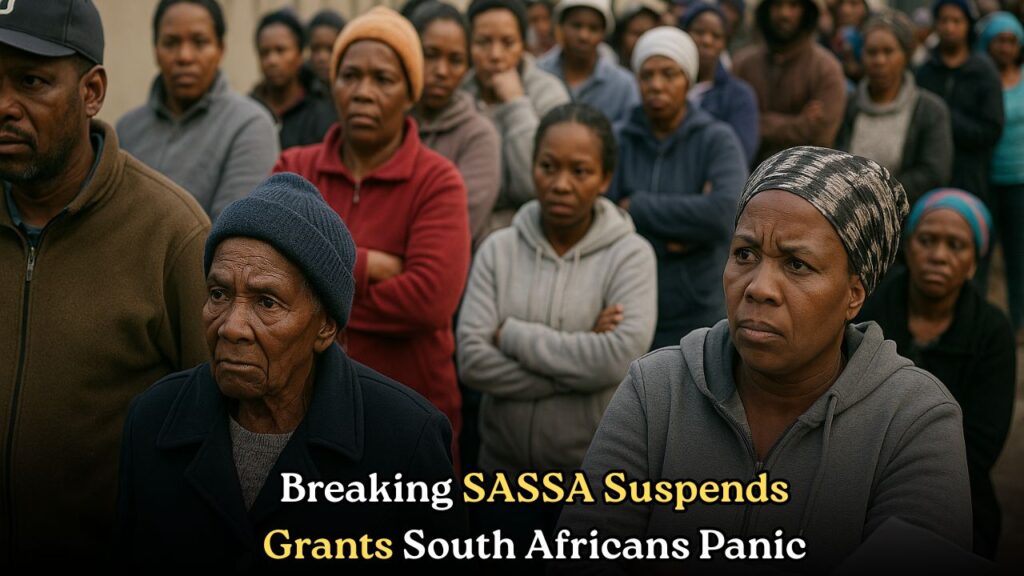SASSA Halts Thousands of Grants: The South African Social Security Agency (SASSA) recently made headlines by announcing a halt to thousands of grants, causing concern among citizens reliant on this vital support. Given the country’s socio-economic landscape, many South Africans depend on these grants for basic needs, making this news particularly impactful. SASSA has been a cornerstone of social welfare in South Africa, providing financial assistance to millions of citizens, including the elderly, disabled, and children. This sudden suspension has raised questions about the stability and future of these essential monthly payments, prompting a national conversation around social security and economic resilience.

Why SASSA Halted Grants: Understanding the Reasons Behind the Decision
The halt on thousands of grants by SASSA has been attributed to an internal review process aimed at ensuring the proper allocation of funds. SASSA has indicated that this measure is temporary and part of a broader initiative to audit and verify the eligibility of recipients. This step is crucial in combating fraud and ensuring that the assistance reaches those genuinely in need. The agency has identified discrepancies in the recipient database, where some individuals were found to be ineligible due to various reasons, including changes in income or status. By pausing certain disbursements, SASSA aims to rectify these issues and streamline the process to prevent future inaccuracies. While the intention is to enhance the efficiency of the system, the immediate impact on beneficiaries is undeniable, prompting discussions on how such interruptions can be minimized to protect vulnerable citizens.
Impact of Grant Suspension on South African Households: Analyzing the Effects
The suspension of grants has had a significant impact on households across South Africa. These grants often serve as a lifeline for many families, providing crucial financial support for essentials such as food, healthcare, and education. The pause in payments has placed additional stress on already strained households, particularly in economically disadvantaged communities. For many, these grants are not merely supplementary income but the primary source of financial stability. The ripple effect of this suspension is felt not only by the immediate recipients but also by local economies that rely on the spending power of grant beneficiaries. As a result, there has been an outcry for rapid resolution and assurance of continuity in grant distribution. Advocacy groups and community leaders are calling for increased transparency and communication from SASSA to mitigate the adverse effects on affected households.
Ensuring Stability in Future Payments: What Steps Are Being Taken?
SASSA has acknowledged the disruption caused by the grant suspension and is actively working towards implementing measures to prevent future occurrences. The agency is investing in improving its database systems and verification processes to ensure accuracy and accountability. This includes adopting advanced technologies for better data management and fraud detection. Additionally, SASSA is engaging with stakeholders to develop contingency plans that can provide immediate support to beneficiaries during such disruptions. Public communication strategies are also being refined to keep recipients informed and reassured of the agency’s commitment to their welfare. By focusing on these areas, SASSA aims to restore trust and ensure the uninterrupted delivery of grants to those who depend on them.
What This Means for the Future of Social Security in South Africa
The recent halt in grants has sparked a broader conversation about the future of social security in South Africa. As the country grapples with economic challenges, the role of social welfare systems becomes increasingly crucial. The incident highlights the need for robust, transparent, and efficient mechanisms to support the nation’s most vulnerable populations. Policymakers are now urged to consider reforms that can enhance the resilience and reliability of social security programs. This includes exploring sustainable funding models and integrating technology to improve service delivery. The situation serves as a reminder of the importance of social safety nets in promoting economic stability and social cohesion. Moving forward, the focus will be on balancing fiscal responsibility with the imperative to safeguard the livelihoods of millions of South Africans reliant on these essential services.




